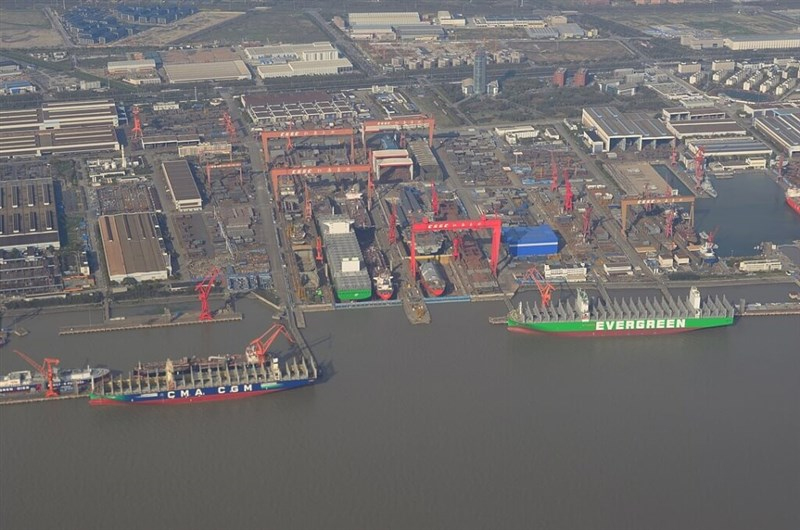Overview
A recent report by the Center for Strategic and International Studies (CSIS) has raised concerns about Taiwan-based shipping company Evergreen Marine Corp. and its ties to China’s shipbuilding industry. The study, titled “Ship Wars: Confronting China’s Dual-Use Shipbuilding Empire,” highlights the alarming extent to which foreign buyers, including Taiwan, are funding China’s shipyards—many of which are closely linked to the Chinese military.
According to the report, over 75% of shipbuilding production in China’s tier-1 and tier-2 shipyards is driven by foreign orders, with Taiwan ranking among the top clients. This situation is particularly concerning given China’s increasing military presence in the Taiwan Strait.
Key Findings of the CSIS Report
- Foreign Dependence on Chinese Shipbuilding
- China’s shipbuilding sector is a key supplier for global shipping companies, including those from Taiwan, Japan, South Korea, and several European countries.
- Many of these ships are constructed in tier-1 shipyards, which receive direct state funding and military contracts.
- Taiwan’s Striking Involvement
- Taiwan’s Evergreen Marine Corp. has sourced around 15% of its fleet from tier-1 Chinese shipyards.
- Some of these shipyards, such as Hudong-Zhonghua and Jiangnan, also produce warships designed for potential military operations against Taiwan.
- Dual-Use Shipyards and Military Implications
- Tier-1 shipyards blur the lines between commercial and military activities, leveraging their infrastructure for both civilian vessels and advanced naval production.
- The expansion of China’s naval capabilities is directly supported by these facilities, raising concerns about unintentional contributions to China’s military development.
- Potential Security Risks for Taiwan
- Taiwan is already facing direct military threats from China, with increased People’s Liberation Army Navy (PLAN) activity near its waters.
- By purchasing vessels from tier-1 Chinese shipyards, Taiwanese firms are indirectly helping to sustain the same facilities that build warships targeting Taiwan.
- Policy Recommendations by CSIS
- The U.S. and its allies should take informal but firm actions to discourage their companies from ordering ships from China’s tier-1 shipyards.
- Washington should encourage alternative shipbuilding partnerships that do not strengthen China’s naval capabilities.
- Taiwanese authorities must reassess their supply chains and reduce reliance on Chinese shipbuilders to avoid inadvertently supporting potential military threats.
Industry Response and Future Outlook
The report has ignited discussions about Taiwan’s shipbuilding strategy and its dependency on China. Critics argue that cost savings should not come at the expense of national security, while industry leaders insist that Chinese shipbuilders offer competitive pricing that is hard to ignore.
Evergreen Marine Corp. has yet to release an official statement addressing the concerns raised by CSIS. However, with Taiwan strengthening its own shipbuilding industry, there may be a shift toward local or allied production in the future.
If Taiwan continues sourcing vessels from China’s military-linked shipyards, it could complicate its security position while indirectly funding the expansion of China’s naval dominance.
FAQs
Why is Taiwan’s involvement in China’s shipbuilding industry a concern?
Taiwan is under direct military threat from China, yet its shipping companies are purchasing vessels from Chinese shipyards that also produce warships for the People’s Liberation Army Navy (PLAN). This indirectly supports China’s military expansion.
What are tier-1 and tier-2 shipyards?
Tier-1 Shipyards: Shipyards that receive significant state funding, military contracts, and actively contribute to China’s naval development.
Tier-2 Shipyards: Shipyards with less direct military integration but still engaged in dual-use production.
What percentage of Taiwan’s ships are built in China’s military-linked shipyards?
Around 15% of Evergreen Marine Corp.’s active fleet was built in tier-1 shipyards, with more orders still pending.
How does China benefit from foreign ship orders?
Foreign orders provide steady revenue, keeping Chinese shipyards financially strong. Since many of these shipyards also produce naval vessels, this indirectly supports China’s military growth.
What actions are recommended to address this issue?
Encouraging Taiwan and other U.S. allies to source ships from non-Chinese shipbuilders.
Promoting alternative shipbuilding partnerships to reduce dependence on China.
Enhancing domestic shipbuilding capabilities to ensure security and economic sustainability.


